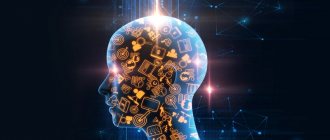Despite the fact that many equate the concepts of intelligence and thinking, there is a difference between them. While thinking is a designation for human mental activity, intelligence is the ability for this process. The following difference: thinking is a basic innate complex of cognitive capabilities, intelligence is a more complex structure that can be developed. At the same time, thinking, as a basic component of intelligence, can develop simultaneously with it.
Intelligence
There are many definitions of intelligence. It characterizes the following abilities:
- cope with new or difficult situations;
- learn from experience;
- adapt to new circumstances;
- adaptive behavior in the context of changing conditions.
In addition to the definition of the concept of intelligence, there are differences in the opinions of scientists even on whether it should be understood as one whole, or whether it is divided into several relatively different types.
For example, according to the theory of American psychologist Robert J. Sternberg, intelligence consists of 3 components:
- analytical thinking, mainly involved in solving problems that a person has encountered in the past;
- creative thinking used to find ways to solve problems;
- practical thinking related to everyday life.
His colleague, Howard Gardner, identifies 8 types of thinking and intelligence:
- linguistic;
- logical-mathematical;
- visual-spatial;
- motor;
- musical;
- interpersonal;
- intrapersonal;
- natural.
Later he identified the 9th type, the so-called. existential intelligence.
Edward Thorndike identifies only 3 main types of intelligence:
- theoretical (abstract);
- practical (specific);
- social – the ability to control others (includes emotional intelligence).
From the listing of the above-mentioned components, it becomes clear that some of them have a greater connection with the theoretical part of life (education), others with the practical (work experience, the art of coping with life). The ability to achieve high incomes is a matter of practical application of theoretical knowledge acquired through study, observation, and education. Both the first part (acquiring knowledge) and the second (the ability to apply it in practice) can fail. Some people who have good thinking and intelligence do not receive an education that matches their IQ level. Reasons can range from financial, geographical, political factors to excessive criticism of teachers.
Social intelligence is also important. It includes the ability to process, recognize, control emotions, build quality, long-term relationships, and collaborate with others. Social skills have a significant impact on obtaining jobs or lucrative orders. Success is predetermined by the following skills:
- appeal to people;
- impression;
- good work in a team and with superiors;
- creating an appropriate network of contacts and acquaintances;
- penetration into the secrets of the organizational structure;
- understanding the written and unwritten rules of behavior in the new team.
Relationship between mental and emotional intelligence
Emotional intelligence (EI) is a person’s ability to recognize, identify (reflect), manage their emotions, understand the emotions of other people, and effectively influence them. These abilities, according to experts, are the most important for life.
In management practice, EI is underestimated; in companies and organizations it is still customary to look at successful performance results as the fruits of high mental qualities of employees. In fact, a person's feelings and emotions (as well as their relationship with the mind) are very important. They influence what gets our attention, how we think, and what we decide. For example, a hungry person in a shopping center sees food, a well-fed person sees shoes, books.
The relationship between mental and emotional intelligence has not yet been fully correlated. But many interesting things are already known. A person’s creative abilities and successful activities are the result of his productive thinking, the essence of which is complex. These qualities are not due only to high mental abilities. They are the result of a combination of rational thinking ability and EI proportional to the nature of the situation.
The characteristics of thinking and intelligence in psychology suggest that very smart people do not always have highly productive thinking. Their productive thinking may be lower than that of the average intelligent person.
When mental intelligence is high, creative and productive thinking is low.
People who score more than 120 on IQ tests have only a 5-15% chance of successful leadership. They do not have a good ability to inspire and motivate other people.
Primary mental abilities
These abilities constitute the fundamental elements of intelligence and all human activity. The number of such primary mental abilities is quite large. For example, the famous intelligence researcher J. Guilford discovered 120 such elementary factors, thanks to the development of which the quality of mental activity of any individual increases.
Some primary mental abilities can be divided into a number of categories, listed below.
- Ability to perform mental operations. Includes analysis, synthesis and comparison of objects and phenomena. This also includes the creation of complex mental structures and the ability to draw competent conclusions.
- Verbal abilities. They determine the possibilities of understanding speech and using speech units both in the course of their own inventions and reasoning, and for communication with other people.
- Memory. It implies the maximum volumes of stored information, the speed of assimilation and long-term memorization, as well as the duration of its availability for use at any time.
- Ability to perform basic arithmetic operations, oral and written calculations in an acceptable time frame.
- The ability to navigate in space, as well as visually determine the sizes, volumes and shapes of various objects.
The combination of these abilities implies the presence of a certain intellectual level of development of the individual. Nevertheless, it is worth noting that all of the above primary characteristics are rarely developed to an equally high degree, which is undoubtedly influenced to a certain extent by the hereditary factor.
Thinking
Thinking is one of the cognitive processes. It is mainly about working with information, ideas, concepts. Thinking allows a person to find correlations and solve problems.
Functions of thinking:
- formation of concepts;
- recognition and search for relationships;
- problem solving;
- creating something new.
The result is new information, experience, knowledge.
Properties
With regard to thinking, several properties are distinguished:
- Convergence. The ability to stick to a specific topic, follow the line of logical context.
- Divergence. Also called artistic, creative thinking, characterized by a wide range of possibilities.
- Worldview. Determines how much knowledge and problems a person can incorporate or solve in their thinking.
- Depth. Determines the extent to which a person can go into detail about a problem (for example, through analysis).
- Accuracy (reliability). Determines how logical, practical, and correct the ideas are.
- Independence. The ability to solve problems may be more or less dependent on the help of other people.
- Flexibility. The ability to break away from thought patterns and find the most effective solution to a given problem (for example, overcoming functional fixation).
- Criticality. The ability to conduct a critical analysis of individual knowledge and the process of solving a problem.
Types
Thinking is divided into several types according to various parameters.
Concrete VS Demonstrative VS Abstract:
- Concrete - directly refers to practical subjects, a person thinks that he will do. This option is impractical, time-consuming, and tedious.
- Indicative - before starting to do something, a person imagines how it will happen. This option is more practical and faster.
- Abstract - a person does not imagine any objects, thinks abstractly. This is how, for example, mathematical equations are solved.
Analytical VS Synthetic:
- Analytical - analyzes the whole thing, divides it into smaller parts, which it analyzes again.
- Synthetic - combining knowledge and facts into one concept.
In practice, both types are often used.
Convergent VS Divergent:
- Convergent – searching for one correct solution.
- Divergent – search for all possible solutions.
Due to the similarity of these types, they are also often used together - first divergent thinking, then convergent thinking.
Reasoning
It is a thinking process in which conclusions are based on information.
Ways of reasoning:
- Deduction is the subtraction of conclusions for a specific case from general rules (one is determined from the set). Example: Socrates is a man → man is mortal → Socrates is mortal. Deduction never brings any new information.
- Induction - goes in the opposite direction than deduction - from one to many. It is a matter of establishing general rules based on specific cases. Example: Peter has a car → Alexander has a car → all men have cars. Inductive judgments are always applied only with a certain probability, never with 100%. All scientific theories are based on inductive reasoning.
Thinking and problem solving
Mental operations are purposeful mental manipulation of mental content aimed at solving both theoretical and practical problems.
Mental operations are divided into 2 categories:
- Logical operations are governed by precise rules that should not be violated. In the process of solving a problem, a person follows an algorithm (just like a computer). The solution is correct and accurate. However, in everyday life this is an impractical and time-consuming path.
- Heuristic operations are abbreviated thinking practices that lead to results without individual consideration of all options and alternative approaches. The results are assessed in terms of suitable/unsuitable. This option is extremely fast and efficient compared to the previous one, but it is also saddled with a high error rate.
Concept
From Latin this word is translated as understanding, knowledge. Intelligence is the ability of our brain to understand and solve certain problems.
Plato was the first to raise the idea of the cult of intellect. In all his texts he attached great importance to thinking. He wrote that life without curiosity, the desire to learn new things, is impossible. Plato was fully supported by his student Aristotle, who developed the concept of the primacy of reason. He said that the one who has the inclination to rule should rule, and others should obey.
The level of mental abilities can be developed and increased, or it can be decreased. Academician Moiseev states that intelligence is the creation of a successful strategy, planning your steps, which will help you achieve your desired goal. This is the organization of one’s life and activities with the help of other abilities, which include: learning, thinking, the ability to classify, integrate, isolate unnecessary things, find connections and patterns.
The main properties of intelligence are:
curiosity - the desire to learn something new, to explore phenomena; depth of mind - the ability to find the main and important things in a pile of information, and weed out the unnecessary; logic - consistency of reasoning, the ability to build reasonable and correct chains, taking into account relationships and details; mental flexibility - a person’s ability to use his capabilities, experience, knowledge, without using templates, but creating his own solutions to problems; breadth of thinking - the ability to fully study data, not lose information, see several solutions to a problem; critical thinking - the ability to evaluate the result of work, find the right ones and weed out the false ones, also the ability to change the path if it is not the true one; evidence of the mind is to find facts and use them at the right moment to make sure that the goal is correct.
In ordinary life, an individual always uses his thinking abilities to understand the world around him, take next steps and find the optimal solution. It is quite difficult to imagine even a day of life without the ability to analyze the situation and compare facts and objects.
Only through the thought process is there the possibility of self-development and personal improvement. Without intelligence, a person would not be able to make scientific breakthroughs, create cures for dangerous diseases, create music, or paint pictures.
Does the correctness of decision making depend on the degree of thinking and intelligence?
Reason is not always the key to making good decisions. The British online publication Independent reports this, citing the scientific journal Research Digest. A high IQ can lead to academic success, but good decisions are made through critical thinking, without undue emotional burden.
Probably every person has a friend or acquaintance who has an extraordinary mind, but at the same time commits many stupid things: either slams the keys in the car, or falls for Internet fraud.
According to new research cited by the author of an article in the Independent, a high IQ does not necessarily mean that a person has good critical thinking.
Disorders of thinking and intelligence
Mental disorders belong to the field of psychiatry and can be congenital or acquired:
- congenital pathology – oligophrenia;
- acquired pathology – dementia.
In both cases, sick people are characterized by a disorder of thinking ability, often of daily physical activity, and independence.
AI Philosophy
The philosophy of artificial intelligence (AI) is a branch of philosophy that attempts to answer the following questions:
- What is the essence of intelligence? Can a machine completely replace the thinking of the human mind?
- Is the nature of a computer and the human brain the same? What methods does the human brain use to create consciousness (or at least the illusion of it)?
- Can a machine have a mind, mental states, consciousness similar to that of a human? Can a machine feel?
These three questions regarding thinking and intelligence in philosophy reflect the different interests of AI scientists. The scientific answer to these questions depends entirely on the definitions used of “intelligence,” “consciousness,” and “machine.”
Some of the main tenets of AI philosophy include:
- Turing's "Polite Convention": "If a machine behaves as intelligently as a human, then it is as intelligent as human beings."
- Offer Gift.
- Newell and Simon's physical symbol system hypothesis: “The physical symbol system has all the necessary and sufficient means for the general activity of the intellect.”
- John Searle's argument: "A perfectly programmed computer with the right inputs and outputs would have a mind indistinguishable from the human mind."
- Hobbes' mechanism: "Reason is nothing more than calculation."
The topic of intelligence in psychology and philosophy is still open. Until now, no concept has been accepted as the only correct one; research in this area continues. In addition to the biological basis of cognition, psychologists focus on historical, evolutionary, social, emotional, moral, cultural aspects and contexts. The concept of intelligence does not apply only in the theoretical or abstract plane, but also extends into the real world.
Individual characteristics
The traditional concept in psychology distinguishes the classification into three types of intelligence:
- Innate, which cannot be learned and instilled.
- Social-behavioral, which can be traced in actions and statements
- Assessable, it is measurable through psychological tests.
People differ not only in the presence of abilities, but also in their qualitative characteristics, a set that is characteristic of the individual. It is impossible to say unequivocally that a talented artist will be the same in dancing. But the fact that differences in the level of mental activity are noticeable almost from birth is possible.
Face-to-face consultation
What are the features and advantages of face-to-face consultation?
Skype consultation
What are the features and benefits of Skype consultations?
If a child shows curiosity about the world around him, causes a lot of trouble by unwinding toilet paper, knocking over food, or dragging a domestic cat by the tail - rest assured, this is a sign of high intelligence. But the quiet one, with whom, according to the parents, they were lucky, is unlikely to stand out with a high level of IQ. To evaluate it correctly, assessment techniques are used in the form of tests with different tasks for different age categories.
What does intellectual level depend on?
We receive a certain set of qualities from birth, by inheritance. It is impossible to influence them. But we are talking about only half of the skills. The other is acquired during growing up and depends not only on natural data: the mobility of neurons, reaction speed, the nature of the nervous system, but also on the social environment in which the personality develops.
The emotional connection between the child and mother is of particular importance for the development of mental abilities. Children who are surrounded by love, affection and care show better results on intelligence assessment tests.
Age differences
Measuring intelligence in the same person at different ages will give interrelated results. That is, if a child at 5 years old was distinguished by intelligence and intelligence, indicators of brain activity. most likely to remain high at 20 and 40 years of age. However, a 100% guarantee cannot be given.
For example, Pascal, being 13 years old, participated in meetings of the academic council on mathematics, and Einstein at the age of 15 was expelled from school for poor performance.
Comparing the indicators of different age groups, we will see certain patterns:
- the coefficient increases until the age of 17-18, slowing down during transition periods when the brain is “busy” solving other issues;
- after 20 years, development slows down significantly;
- logical, analytical and arithmetic potential is revealed by the age of 30;
- medicine is easier at the age of 40-45, psychology after 50;
- All years are submissive to art; researchers have not established restrictions.
An interesting fact is that there is no obligatory regression of intellectual activity. Of course, in older people, physiological processes affecting the cerebral cortex are disrupted, but a person gains important life experience that helps him apply the knowledge that he has accumulated.
Gender differences
Although the stereotype about the huge difference in mental abilities of the stronger and weaker sex is constantly discussed in society, no one has yet been able to scientifically substantiate the existence of an “intellectual gap.” Indeed, the average level of intelligence is approximately the same for men and women. The difference is observed in the following aspects:
- girls under 15 develop much faster than boys;
- Males are better able to shine with mathematical talents, while women are distinguished by the development of speech, emotional activity and creative skills;
- The priority of the fair half is non-standard thinking.









